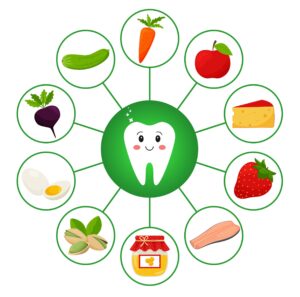Snacking and tooth decay
Did you know that snacking throughout the day can cause cavities? I bet you are wondering why this would happen. The more we snack, the more germs or bacteria we will have. The bacteria make acid that eats the foods we eat and makes more acid that dissolves the teeth. These germs especially like many of kids’ favorite foods, like Cheese-its, fishy crackers, graham crackers, and of course, anything with sugar. You can do some helpful things to prevent cavities, even with snacking.
Let’s look at some ideas.
If you are at all like me, you snack for many reasons. Yes, of course, we eat when we are hungry, but I am sure most of us eat when we are bored or feel stressed too. When we are stressed, like during a pandemic, many of us eat when we are sad, overwhelmed, depressed, angry, and frustrated to comfort and to distract us from these difficult feelings. We also snack to celebrate. The pandemic has stressed many people out for the last few years. People at home  working, attending school, taking care of kids have easier access to the fridge or cupboards filled with food calling out to us. And it is so much easier to eat prepared foods such as crackers, chips, cookies, anything with sugar, and other processed foods. These foods are made with white flour and are simple carbohydrates. These are the foods that germs love to eat! They also stick to our teeth longer, making it easier to get cavities. When I go to the schools to do sealants, if I see the kids after lunch, I see lots of foods stuck on their teeth that are not easy to remove. The ones I see most are the orange-colored cheesy crackers! The longer these foods stay on the teeth, the longer the germs make the acids, and the more likely cavities are.
working, attending school, taking care of kids have easier access to the fridge or cupboards filled with food calling out to us. And it is so much easier to eat prepared foods such as crackers, chips, cookies, anything with sugar, and other processed foods. These foods are made with white flour and are simple carbohydrates. These are the foods that germs love to eat! They also stick to our teeth longer, making it easier to get cavities. When I go to the schools to do sealants, if I see the kids after lunch, I see lots of foods stuck on their teeth that are not easy to remove. The ones I see most are the orange-colored cheesy crackers! The longer these foods stay on the teeth, the longer the germs make the acids, and the more likely cavities are.
So how does snacking affect our teeth?
 The germs in our mouths love to eat the foods we eat and to do this, they make acid. This acid in your mouth starts to dissolve the teeth, which softens the enamel, the thin outer covering of the tooth, and a cavity begins. Simple carbohydrates and anything with sugar, juice, drinks other than water (even diet sodas), cake, bread (especially white bread), and acidic foods like lemon and vinegar help the germs make even more acid. You just don’t want to have these foods sitting in your mouth and on your teeth for a long time. Each time we eat, our mouths will be acidic for 20-60 minutes. Every time you or your child eats and drinks, there is more time for the germs to eat and more chances for cavities to start.
The germs in our mouths love to eat the foods we eat and to do this, they make acid. This acid in your mouth starts to dissolve the teeth, which softens the enamel, the thin outer covering of the tooth, and a cavity begins. Simple carbohydrates and anything with sugar, juice, drinks other than water (even diet sodas), cake, bread (especially white bread), and acidic foods like lemon and vinegar help the germs make even more acid. You just don’t want to have these foods sitting in your mouth and on your teeth for a long time. Each time we eat, our mouths will be acidic for 20-60 minutes. Every time you or your child eats and drinks, there is more time for the germs to eat and more chances for cavities to start.
So, what can you do?
We know that kids are grazers, they eat a little, go off and play, eat a little more, go off and play and they do this all day long. I love when kids can listen to their bodies and eat when they are hungry, and stop when they are full. But if we want to prevent cavities, one thing we can do is to limit snacks to a couple of times a day. We can also give our children unprocessed foods that are low in sugar and not made with white flour. Drinking only water in between  meals can help too. If you or your children want other drinks, have those with your meal as there will be more saliva to help protect against the acids. It might surprise you that some bottled waters are very acidic. This is to make sure no bacteria grow in the water while it is sitting on the shelf! If you drink bottled water, you can search its acidity or pH level on the internet. Type in: What is the pH of (your brand of water)? The best pH is 7, which is neutral. If the pH of what you would like to drink is below 5.5, it can start to dissolve or soften your teeth and make cavities more likely. The water from your kitchen sink will be best for your teeth, but it is also probably cheaper than buying bottles of water and will help protect the environment.
meals can help too. If you or your children want other drinks, have those with your meal as there will be more saliva to help protect against the acids. It might surprise you that some bottled waters are very acidic. This is to make sure no bacteria grow in the water while it is sitting on the shelf! If you drink bottled water, you can search its acidity or pH level on the internet. Type in: What is the pH of (your brand of water)? The best pH is 7, which is neutral. If the pH of what you would like to drink is below 5.5, it can start to dissolve or soften your teeth and make cavities more likely. The water from your kitchen sink will be best for your teeth, but it is also probably cheaper than buying bottles of water and will help protect the environment.
Here is some information on some common drinks and how acidic they are. It is best to drink things that range between 6.5-8.5 pH. https://markdannerdmd.com/downloads/table-beverage-acidity.pdf
What else can you do?
 What if you are hungry during the day? Choose your snacks wisely. Try veggies, fruit (not juice), nuts, seeds, plain unsweetened yogurts (you can add fruit), cheese, and meat. Crunchy fruits and veggies like apples, carrots, and celery have more fiber, and when you eat them, you will have more of the amazing saliva to protect your teeth. Dairy has its own sugars but also has calcium that helps to make your teeth stronger. The stronger the teeth are, the more difficult it is to get cavities. I love cheese, sometimes too much! Maybe we should practice what the in France do. They eat cheese for dessert instead of sweets like we do here in the United States!
What if you are hungry during the day? Choose your snacks wisely. Try veggies, fruit (not juice), nuts, seeds, plain unsweetened yogurts (you can add fruit), cheese, and meat. Crunchy fruits and veggies like apples, carrots, and celery have more fiber, and when you eat them, you will have more of the amazing saliva to protect your teeth. Dairy has its own sugars but also has calcium that helps to make your teeth stronger. The stronger the teeth are, the more difficult it is to get cavities. I love cheese, sometimes too much! Maybe we should practice what the in France do. They eat cheese for dessert instead of sweets like we do here in the United States!
Amino acids are the building blocks of proteins, and your body cannot make the essential amino acids, so they must come from the foods you eat. The amino acids called arginine can help prevent cavities. Arginine makes your mouth less acidic, making it harder to get cavities. The food with the highest amount of arginine is turkey breast. Other foods with a lot of arginine are pork loin, chicken, soybeans, pumpkin seeds, chickpeas, dairy, lentils, peanuts, and spirulina. These make great snacks.
 Some dental products have arginine in them too. One is a toothpaste called Tom’s Rapid Relief, and the other is called Basic Bite Chews. You can ask your dentist where to find them.
Some dental products have arginine in them too. One is a toothpaste called Tom’s Rapid Relief, and the other is called Basic Bite Chews. You can ask your dentist where to find them.
We all need to eat, but we can do so wisely, not only for overall health but also for our oral health. By eating a variety of foods, less sugar, and fewer acidic drinks, we can keep our teeth healthy. Here is to healthy and smart snacking!